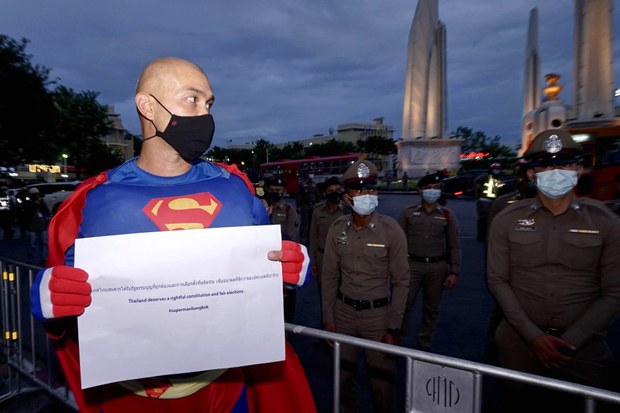Thai PM Warns of Mobs in Bangkok as Students Plan Weekend Protest
2020.09.17
Bangkok
 A Thai protester dressed as Superman participates in a rally at the Democracy Monument in Bangkok, Aug. 3, 2020.
A Thai protester dressed as Superman participates in a rally at the Democracy Monument in Bangkok, Aug. 3, 2020.
Thai Prime Minister Prayuth Chan-o-cha on Thursday warned of “mobs” swarming the capital this weekend, as police announced plans to deploy nearly 10,000 officers ahead of an anti-government demonstration which could draw 70,000 to 100,000 people, according to organizers.
Such a large-scale protest could help spread COVID-19 and do more harm to an already battered economy, Prayuth said during a televised address to the nation.
“Let me also take this opportunity to speak directly to those who wish to gather as mobs for various reasons. When you gather in mobs you are creating an enormous risk of new infections,” the prime minister said.
“And with that, you also create enormous risk to the livelihoods of tens of millions of fellow Thais. Any major flare up of infections will lead to terrible consequences and even worse economic destruction, the likes of which we have never seen.”
Prayuth pointed to similar gatherings elsewhere as being responsible for coronavirus outbreaks.
“In other countries, such gatherings and carelessness by some groups have now caused even more suffering to everyone,” he said.
“In Britain and other parts of Europe, ministers are talking about imposing new lockdowns,” Prayuth said. “In Australia, its most populous state has imposed many restrictions on the opening of shops, offices and even on leaving home.”
This weekend’s planned rally is expected to be the largest since mid-July when thousands of high school and university students gathered to protest against the government. Since then similar rallies have sprung up where participants have called for Prayuth to dissolve parliament to make way for a new election, stop harassing activists and opposition figures, and rewrite the constitution.
At an Aug. 10 rally, protest leaders announced a set of 10 demands that would diminish the power of Thailand’s monarchy by requiring changes to the constitution.
“Whether or not a constitutional amendment can be achieved, we have to see how many join the protest this weekend,” Arnon Nampa, a human rights lawyer who is one of the main leaders of the protests, said on his Facebook page Thursday.
The demands were seen as daring because speech deemed as insulting to the Thai monarchy is punishable by prison terms of up to 15 years under the country’s notorious Lese-Majeste law, which guards against royal defamation but has not been applied in months.
“Would this political uprising make us reach the goal? – It’s exciting,” said Arnon, who has been arrested three times since the rallies began.
Police have arrested 13 other protesters while 15 others have turned themselves in to law enforcement officials. Those arrested face charges including sedition, organizing gatherings of 10 or more people to incite unrest, and leading mass gatherings that could spread COVID-19.
Announcing plans for a rally at the Thammasat University campus in Bangkok on Saturday afternoon – followed by a 3-km (1.9-mile) march to Government House on Sunday morning –organizers said they expected to draw 70,000 to 100,000 protestors.
The university’s rector has said she would not allow the campus to host the rally over safety concerns, leading student organizers to vow to force open entrances to accommodate other protesters.
Security efforts
Police, meanwhile, planned to mobilize close to 10,000 officers to guard Government House.
“The Government House temporarily relocated some items – especially important documents – and automobiles. The police have set up a command center at a building inside as a command post,” police Col. Watcharavee Thammasema of the special branch bureau told reporters on Thursday.
Lt. Gen. Pakpong Pongpetra, the chief of the Bangkok Metropolitan Police, said his department had adopted a contingency plan to prepare for possible violent incidents. The plan includes negotiation efforts and the use of non-lethal weapons.
“Should the situation spin out of control, the military would take over and declare martial law,” he said.
By comparison, rallies in 2014 that led to the overthrow of the democratic government of Yingluck Shinawatra by a Prayuth-led coup drew as many as 1 million people and turned violent.
Government House, which houses the prime minister’s office, has been stormed by mobs on several occasions. Those include protests involving royalist “Yellow Shirt” protesters who marched to oust Prime Ministers Samak Sundaravej and Somchai Wongsawat – who were seen as the puppets for Yingluck’s brother, Thaksin Shinawatra.
When royalist Abhisit Vejjajiva succeeded Somchai as prime minister, a group of Red Shirts –supporters of the Shinawatras – rallied against him.
Thaksin, who also served as prime minister, was toppled in a military coup in Sept. 19, 2006.
Organizers said they chose Saturday, the 14th anniversary of the overthrow of Thaksin’s government, to symbolically call for no more military coups.
Despite Prayuth’s dire warning, Thailand reported no new infections on Thursday and recorded its last COVID-19-related death on June 2. Since the outbreak began, the nation has recorded 3,490 infections.
Globally, nearly 30 million COVID-19 infections and more than 942,000 deaths have been recorded, according to disease experts at U.S.-based Johns Hopkins University.







